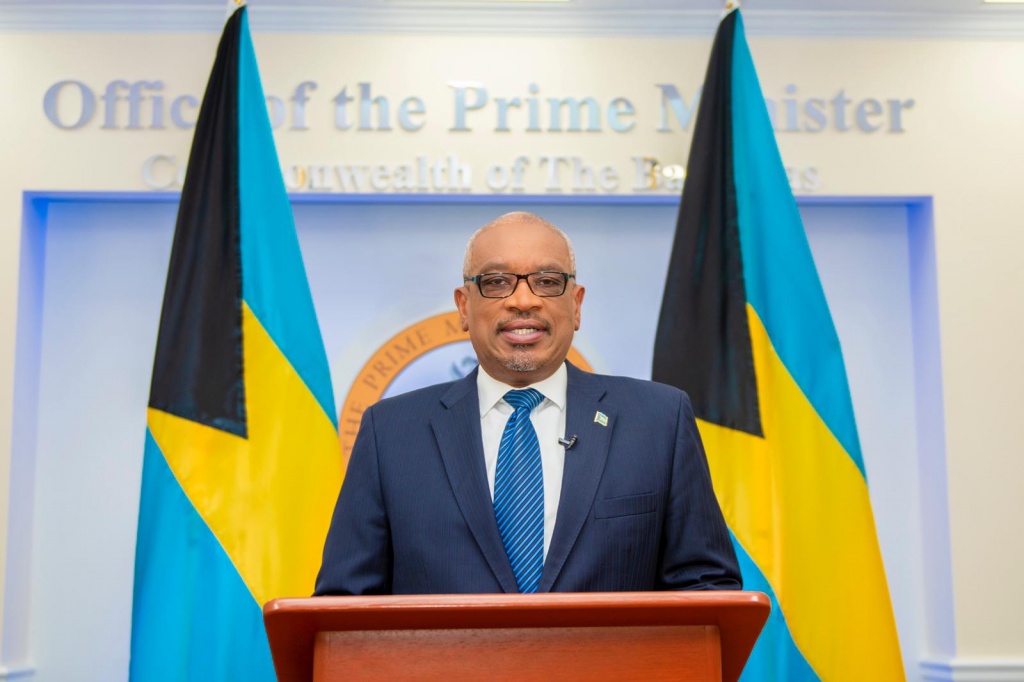
Prime Minister, the Most Hon. Dr. Hubert Minnis, was the keynote speaker during the opening session of the Bahamas Business Outlook on Thursday, January 14th, 2021, where he spoke about government incentives and assistance initiatives for businesses within the country, along with intended efforts to continue with a number of national infrastructure projects, in light of significant cuts in the 2021 Capital Works budget. Read the full speech below:
PM Minnis’ Bahamas Business Outlook Speech – January 14th
“It has been a longstanding custom for the prime minister to address the annual Bahamas Business Outlook. I am pleased to have continued this tradition over the past several years. For an impressive 30 years now, this forum has served as an opportunity to review the economic and business outlook and prospects for a new year.
Still, we know from experience, that despite the best-laid plans and projections, unpredictable events often outstrip even the best intentions and estimations. That was true for 2019, with the unprecedented devastation caused by Hurricane Dorian. It was true again in 2020, with the worst global pandemic in our lifetime, which has caused millions of deaths and the worst economic devastation since the Great Depression.
Before Hurricane Dorian and the pandemic, the Bahamas economy was recovering and growing. Our real GDP growth, which slowed as a result of Hurricane Dorian, contracted even further because of this deadly virus.
Vaccines:
During the COVID-19 pandemic, the Government’s leading priority is to save lives. We were determined to care for the social needs of the Bahamian people. We also put in place emergency economic measures, which I noted in my New Year’s Address this past Tuesday. I also announced, a consultative COVID-19 vaccine committee, headed by Dr. Merceline Dahl-Regis. To restore our public and economic health, vaccinations are vital and critical.
We will utilize the necessary funds and resources to provide for an effective rollout of vaccines throughout the country. This is among our highest priorities!
Infrastructure:
After becoming Minister of Finance, I announced a team of economic and finance advisors, including former banker and businessman Nathaniel Beneby. His responsibilities include the implementation of recommendations from the Economic Recovery Committee (ERC) and advancing the ease of doing business for Bahamians and international investors. One of Nat’s priorities, in coordination with other officials, is to accelerate the realization of domestic and foreign investments projects that are currently in the pipeline.
We are going to get Bahamians back to work as quickly as possible. We are getting projects moving that will generate jobs and will stimulate economic opportunities for Bahamians.
Given the current state of public finances, the government has had to make some very tough decisions. As a temporary measure to avoid any further deterioration in our fiscal position, we are reducing new capital expenditure for the current fiscal year.
However, for a number of planned new projects, the Government is exploring creative alternatives to finance such critical infrastructure.
These projects include:
• site works at the Exuma International Airport
• the Long Island International Airport at Deadman’s Cay;
• the North Eleuthera International Airport and upgrades to the Leonard Thompson International Airport at Marsh Harbour.
Similar to the Lynden Pindling International Airport model, the Government intends to aggressively implement a Public Private Partnership program to complete these capital projects.
Such Public Private Partnership methods may include the use of passenger facility charges and other airport usage fees to fund the development of our Family Island infrastructure, as opposed to funding exclusively via the Public Treasury. While we must adapt the mode of financing for a number of key infrastructure projects, our commitment to develop Family Island infrastructure remains as strong as ever.
Such significant investment in airport infrastructure will support increased airlift to our Family Islands as tourism rebounds. It also represents some $150 million in infrastructure stimulus spending in these islands.
Sovereign Wealth Fund:
I am happy to advise that we intend to accelerate the implementation of a Sovereign Wealth Fund, another recommendation of the ERC. The Government has already executed a legal review of the Sovereign Wealth Fund Act of 2016, with a view to enhancing the provisions of the legislation. The proposed legislative changes fully embrace the Santiago Principles, which are international best practices designed to address concerns by investors and regulators about transparency, accountability, and the governance structure of such Funds.
Countries typically look to form a sovereign wealth fund to manage and invest excess cash from royalties and budgetary surpluses. While the Bahamas is not yet at that point in our development, we appreciate that we have valuable land and other natural resource assets.
We also recognize that the country needs an independent, non-partisan, transparent, accountable entity to manage some of our most valuable land and our precious natural assets for the benefit of the Bahamian people. Such oversight may help to reduce corruption by public officials.
This Sovereign Wealth Fund will also likely manage a special sub-fund that will be dedicated to expanding critical infrastructure throughout the Bahamas, especially in our Family Islands. To maximize the potential of our Family Islands, critical transportation, health care, education, heritage, cultural, commercial and power infrastructure must be built, and built to world-class standards. In the face of climate changes, such infrastructure must be resilient.
This National Infrastructure Fund will mobilize public and private capital, from local and international sources, to be deployed in the true spirit of public-private partnerships (or PPPs) to meet the estimated two billion in infrastructure development needs throughout our extensive archipelago. The Sovereign Wealth Fund and the accompanying National Infrastructure Fund will transform the way in which we approach the development of our country.
These Funds will enshrine accountable and transparent means for Bahamians to ensure that our national assets are deployed and developed for the benefit of the entire country.
Business Development:
Small business development has been at the heart of my Government’s economic vision and agenda from its inception.
Our vision is greater ownership of our economy by many more Bahamian entrepreneurs, artisans, innovators and dreamers.
Toward this end, the Small Business Development Centre (SBDC) will develop a digital marketplace. This digital space will help small businesses to take advantage of an e-commerce platform without having to invest and build one for themselves.
This platform will enable Bahamian manufacturers and craft people the ability to sell their items online. We are focused on business incubators and start-ups, including tech start-ups. Bahamian small businesses and artisans will be able to access the platform and jointly market products and services locally and internationally.
As of December 31st, 2020, the SBDC has, through the Access Accelerator, approved: $18.8 million dollars in funding and has disbursed $11 million dollars. $41 million dollars has been approved through the Business Continuity program, with $40 million dollars disbursed. In the first round of the Standalone Grant Programme, $985,590 has been granted.
A second round of grants has been initiated with 3,200 applications. A third round will be launched shortly. Currently a total of $2 million dollars has been allocated for standalone grant.
Following the recommendations of the Economic Recovery Committee, The Ministry of Finance has allocated the SBDC a new location to effect two new incubators in New Providence and one new Incubator in Grand Bahama. The Youth Incubator and Tech Incubator will be launched before summer giving young entrepreneurs and tech-based entrepreneurs hands-on assistance with their startups alongside funding. This will be mirrored in Grand Bahama.
Tourism:
Our tourism industry must continue to adapt and to explore new market segments.
We have engaged the assistance of a U.S.-based vendor with an existing database of over 10 million licensees, along with the Association of Marinas, to launch and market digital sports fishing, fly fishing and yacht charter licenses.
While encouraging safe and sustainable fishing practices, increasing efforts to target this market segment is intended to diversify the Bahamian tourism product.
This will mean more economic activity and jobs for bone fishing lodges, fly fishing guides, boutique resorts and the more than 2,000 Airbnb home owners in the Family Islands offering services to this growing market.
Digital Economy:
At the core of the government’s strategy of economic recovery is the ongoing transformation toward a greater digital economy. The Government is a part of a partnership program to train more than 100 software developers to Cisco standards through the Networking Academy Programme of the Bahamas Technical and Vocational Institute (BTVI).
To further advance E-Government, I am pleased to announce that the Government will soon unveil the beta pilot of its “one-stop shop” citizen engagement portal. The platform will provide the Bahamian public and eventually the Bahamian diaspora with greater digital access to government services.
This pilot will offer the following services online:
• renewal of driver’s licenses;
• getting copies of birth, death and marriage certificates;
• and applications for the renewal of adult passports.
Recovery:
The ongoing restoration and recovery of Abaco and parts of Grand Bahama will require one of the most ambitious and dynamic public-private partnerships initiatives in Bahamian history.
There is still a long way to go in the redevelopment and the revitalization of Abaco and parts of Grand Bahama. But we are making steady progress. More than three million cubic yards of debris have been removed across Abaco, the Abaco Cays and Grand Bahama. Eleven million dollars has been spent with hundreds of homeowners assisted under the Disaster Reconstruction Authority’s Small Home Repairs Program.
Working with various partners, the DRA has provided 150 temporary housing domes on Abaco and the Cays, and 20 homes for families at Sweeting’s Cay and East Grand Bahama. Two, 60-acre sites in Spring City and Wilson City, Abaco, have been identified for permanent housing.
The Government, through a public-private partnership with the Discovery Land Company, is developing 46 homes that will be gifted to 46 families. The Government is committed to repairing and providing logistical support to 250 homes in Cooper’s Town, Blackwood, and Fire Road, Abaco. We recently broke ground on a state-of-the-art $1.8 million complex for Greater Abaco, which will serve as a community center and hurricane shelter.
More than $9.5 million has been paid in unemployment benefits to residents of Grand Bahama and Abaco affected by Hurricane Dorian. The Small Business Development Center has approved 74 applications for funding: 31 for Abaco and 43 in Grand Bahama.
$2.2 million has been approved in small business funding. Twenty-seven million has been spent to restore power in Abaco. When completed, the total cost to restore the electricity infrastructure will be approximately $90 million.
The economic recovery of The Bahamas, including tourism, will take time. But recovery has started. There is concrete, tangible hope and our economy will turn around. The Bahamas business and economic outlook for 2021 is: a much better economy, many more jobs, an improvement in public finances, and the beginning of the end of this terrible pandemic.
The Bahamas is getting back to business.
Let us work together to rebuild our economy and country and to get Bahamians back to work as quickly as possible.
Thank you for your attention. I look forward to your help, ideas, investments and collaboration in 2021 and beyond.”





